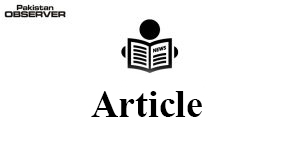Tahir Khan
EDUCATION is the backbone of any nation, for, if
you want to destroy any nation, destroy its educa
tion system. It is education that bifurcates between right and wrong and between a human and beast. It is the mantle that leads one to conquer the forces of darkness. But in Pakistan, it is treated as a posthumous child. Pakistan, even in 21st century, has not been able to achieve its set educational goals. It faces problems ranging from poor budget allocation to the larger number of out-of-school children. No effort has been taken to bring these children back to school. Education continues to suffer and its literacy rate has remained below 60%. According to a recent report published by UNICEF, Pakistan is a country having second highest number of out-of-school children (OOSC) in the world, only behind Nigeria. An estimated number of out-of-school children, according to the same report, is 22.8 million, aged between 5 to 16 years. However, Article 25-A of the Constitution of Pakistan binds state to provide quality of basic education free of cost to children aged between 5-16 years. This state of affairs keeps on decreasing when one follows upward trajectory.
There are many factors behind that deteriorating conditions of education. The most deteriorating being the low budget allocated. Less than two % of the GDP is spent on education. Due to this low budget, students are neither provided uniforms nor does they receive books or stationary. The situation in many of rural area schools of the country are pathetic. The schools in those areas lack basic facilities of clean drinking water, toilets and boundary walls etc. Some schools even does not have roofs and children study in open sky, under the tree. Moreover, there are thousands of ghost schools in every province of Pakistan. These schools cause a severe burden on already strained education budget. A handsome amount of budget is wasted in paying salaries to ghost teachers. Additionally, there are many colleges in Pakistan which become functional only during exams and many vocational institutes exist in official papers only. To make this situation worse, the local fuedals occupy school building forcibly and convert them into stables, store houses or into meeting venues. They prohibit children to get education.
Another cause of deteriorating standard of education is high fee in most of the institutions of Pakistan. Private institutions that impart quality education charge an amount which is unaffordable for majority of students. While, government institutions do not lack behind and charge in lacs, if not in millions. For instance, Quaid-i-Azam University, Islamabad charges more than 60 thousand rupees at a time of admission plus an extra amount of 30-35 thousand rupees for hostel accommodation for one semester only. Mess and laundry charges are taken separately. Hence, in Pakistan where majority of people live from hand to mouth, education has become a dream for them. Actually, the government of Pakistan is directly responsible for that state of affairs. It neither allocates the required amount of money needed by Education Ministries, Higher Education Commission (HEC) and related institutions to run their affairs smoothly, nor does it keep a proper check on education policy formulation and its implementation. Government even does not spend the money given to it by donor countries for the promotion of education. Glaring example of such negligence was seen previous year when Government of Sindh could not spend the amount given to it by Canadian organization to improve education in the rural areas.
However, still there is time to direct the ship of education towards right direction. The best way is to revive and update syllabus throughout the country and to make it standardized; so that every student may avail equal opportunity and may compete equally. Examinations should be conducted at the same time, admissions should be announced at the same time throughout country. This would create uniformity throughout country. Another solution to this imbroglio is to allocate required funds to educational ministries, departments and HEC; keep a check over it as to how and where that budget is being utilized; to find out ghost schools, teachers and bring them to justice. Subject specialists should be inducted into institutions as they have command over their subjects and teach their students in an innovative way; hence, producing good results. Besides, people are in great need of awareness regarding the miracles of education. Therefore, education awareness campaigns should be launched in every nook and corner of the country with special attention to female education, as female covers half the sky. NGOs working on education mission should be regulated, their policies be checked and asked to contribute in awareness campaigns. Finally, a mechanism should be devised to provide platform to students to present their issues and discuss future prospects. In this way, institutions will be streamlined and would create a youth that would meet economic and market expectations of the world and create a good place for Pakistan. Because, “Education is the passport to future, for tomorrow belongs to those who prepare for it today”.
—The writer is a researcher in social and political affairs, based in Islamabad.









